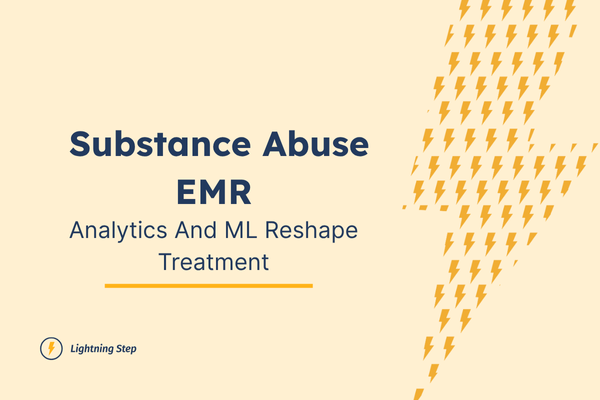
Nearly 70% of people with substance use disorders experience at least one relapse during their recovery. Sarah, a 34-year-old mother of two, was part of that statistic—until her treatment center implemented an advanced EMR system that predicted her vulnerability patterns and intervened before crisis hit. Today's substance abuse EMR technology is changing stories like Sarah's by using data analytics and machine learning to reshape how we approach addiction treatment.
A substance abuse EMR is a specialized electronic medical record system designed specifically for addiction treatment facilities. These platforms go beyond basic record-keeping to integrate clinical workflows, compliance requirements, and patient engagement tools tailored to substance abuse treatment.
Modern EMR systems are evolving from simple data repositories into intelligent treatment partners. Data analytics and machine learning now analyze patient patterns, predict outcomes, and recommend interventions in real-time. Lightning Step's EMR platform exemplifies this evolution, combining traditional documentation with AI-powered insights that help clinicians make better treatment decisions.
The shift from paper charts to digital records transformed addiction treatment. Paper systems created silos where critical information lived in filing cabinets, making it impossible to spot patterns or coordinate care effectively.
Digital EMR systems centralize patient data, provide real-time updates across treatment teams, and maintain compliance with 42 CFR Part 2 regulations that govern substance abuse records. Lightning Step's secure cloud-based infrastructure handles these compliance requirements automatically while giving clinicians instant access to complete patient histories.
The benefits extend beyond convenience. Centralized data enables treatment teams to track medication adherence, monitor therapy attendance, and identify early warning signs that might indicate relapse risk.
Data analytics transforms raw patient information into actionable insights. Advanced EMR systems analyze patterns in cravings, environmental triggers, and treatment responses to create personalized recovery strategies.
Patient stratification becomes possible when systems can process multiple data points simultaneously. Risk scoring algorithms evaluate factors like previous treatment attempts, co-occurring mental health conditions, and social support systems to match patients with appropriate therapy modalities.
Lightning Step's analytics dashboard visualizes treatment outcomes and guides clinicians toward evidence-based decisions. The system tracks which interventions work best for specific patient profiles, helping providers refine their approach over time.
Machine learning takes predictive capabilities further by identifying subtle patterns humans might miss. These models analyze clinical notes using natural language processing to detect changes in patient language that correlate with relapse risk.
Real-time risk alerts notify treatment teams when patients show concerning patterns. A patient who misses appointments, reports increased stress, or demonstrates changes in sleep patterns might trigger an automated alert for immediate intervention.
Lightning Step's ML engine continuously learns from patient data to refine its predictions. The system flags early warning signs and suggests specific interventions based on what worked for similar patients in the past.
Effective substance abuse EMR systems share several characteristics. Customizable workflows accommodate different treatment philosophies, while treatment-plan templates standardize care protocols without sacrificing flexibility.
Automated compliance reporting eliminates manual audit preparation. The system maintains detailed audit trails that satisfy regulatory requirements while reducing administrative burden on clinical staff.
Patient engagement tools keep individuals connected to their recovery outside clinical settings. Secure patient portals allow appointment scheduling and treatment plan review, while automated reminders reduce no-show rates.
Interoperability through FHIR APIs enables seamless data exchange with other healthcare providers. This connectivity supports comprehensive care coordination, especially important for patients with co-occurring medical conditions.
Mountain View Recovery Center struggled with 40% no-show rates and spent hours daily on manual documentation. Clinical staff felt overwhelmed by paperwork, leaving less time for patient care.
After implementing Lightning Step, the center saw remarkable improvements. Patient retention increased by 35% as automated reminders and engagement tools kept individuals connected to treatment. Administrative tasks decreased by 50%, freeing clinicians to focus on therapy.
Dr. Martinez, the clinical director, noted: "The system's predictive alerts helped us intervene before patients reached crisis points. We're catching relapse risks earlier and our patients are staying in treatment longer."
Successful EMR implementation starts with readiness assessment. Evaluate your current infrastructure, staff technical skills, and workflow requirements before selecting a system.
Data migration planning prevents information loss during transition. Map legacy records into the new system's structure and establish protocols for maintaining data integrity throughout the process.
Staff training on analytics tools and ML-driven alerts ensures your team can leverage the system's full capabilities. Focus on interpreting data insights and responding to predictive alerts appropriately.
Establish key performance indicators to measure success. Track metrics like patient retention rates, engagement levels, and clinician satisfaction to gauge implementation effectiveness.
Data privacy concerns require careful attention to HIPAA and 42 CFR Part 2 compliance. Choose systems with built-in compliance features and staff training on privacy protocols.
Change resistance is natural when introducing new technology. Address concerns through comprehensive training, ongoing support, and clear communication about benefits to both staff and patients.
System integration challenges arise when connecting new EMR platforms with existing tools. Plan for interface development and data synchronization to maintain workflow continuity.
The future holds exciting possibilities for substance abuse treatment technology. AI-powered chatbots will provide 24/7 support between appointments, while digital therapeutic modules deliver evidence-based interventions through mobile apps.
Remote monitoring devices will feed real-time data into EMR systems, tracking sleep patterns, stress levels, and location data to provide comprehensive patient insights.
Lightning Step's development roadmap includes enhanced AI diagnostics and expanded telehealth features. These advances will further personalize treatment while making care more accessible to patients in remote areas.
Advanced substance abuse EMR systems with data analytics and machine learning capabilities are transforming addiction treatment outcomes. By predicting relapse risks, personalizing interventions, and streamlining clinical workflows, these platforms help more patients achieve lasting recovery. Lightning Step leads this technological evolution, providing treatment centers with the tools they need to deliver better care. Contact us today to learn how our platform can transform your treatment outcomes.



